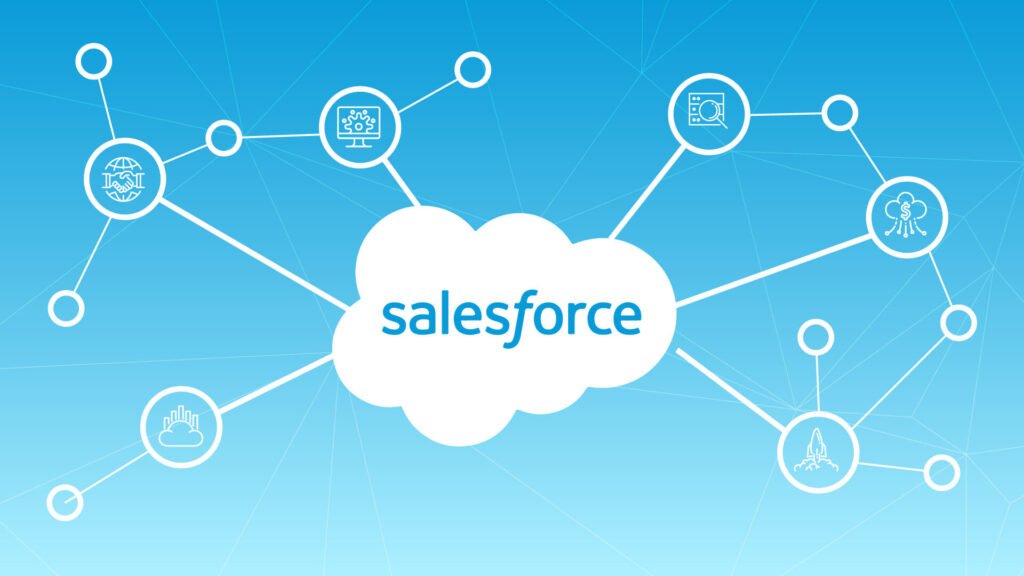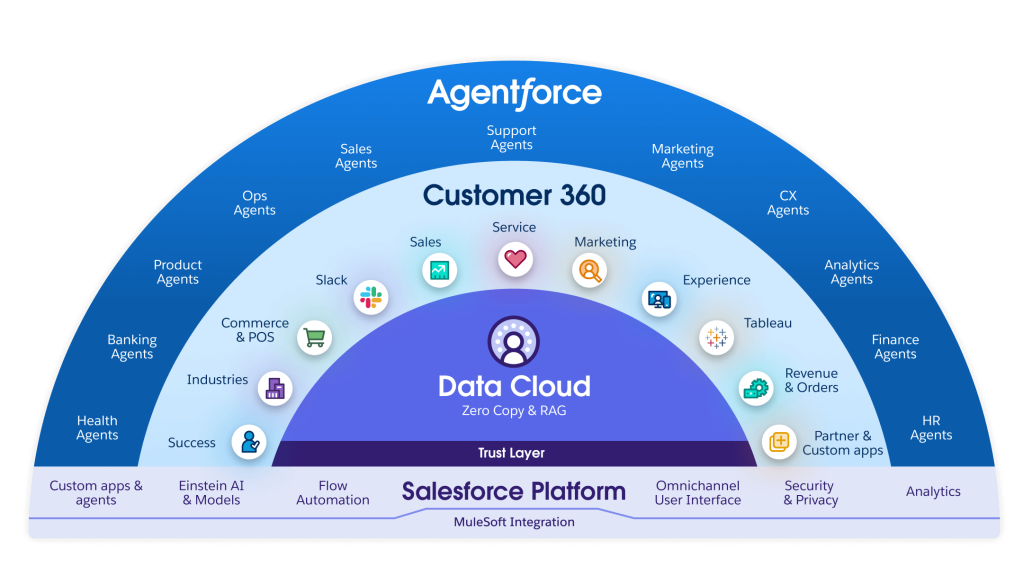Salesforce
- Home
- Salesforce
What is Salesforce?
Salesforce is a leading Customer Relationship Management (CRM) platform that helps businesses manage customer interactions, streamline workflows, and enhance sales, marketing, and customer service. It is a cloud-based solution offering a suite of tools to improve customer engagement, track sales pipelines, and automate business processes.

Key Features of Salesforce
Sales Cloud:
- Manages leads, opportunities, and sales pipelines.
- Provides insights and forecasts to drive sales performance.
Service Cloud:
- Enhances customer service through case management, knowledge bases, and automated workflows.
Marketing Cloud:
- Supports personalized marketing campaigns via email, social media, and other channels.
Commerce Cloud:
- Facilitates seamless e-commerce experiences for businesses and customers.
AppExchange:
- Offers a marketplace for third-party integrations and apps.
Analytics Cloud:
- Delivers powerful insights through data visualization and reporting.
Einstein AI:
- Integrates artificial intelligence for predictive analytics and automation.
Integration Capabilities:
- Connects with third-party systems and tools via APIs for enhanced functionality.
Benefits of Salesforce
Centralized Data Management:
- Consolidates customer data into a single platform for easy access and analysis.
Scalability:
- Suitable for businesses of all sizes, from startups to enterprises.
Customizability:
- Tailors workflows, dashboards, and reports to specific business needs.
Enhanced Collaboration:
- Provides tools like Chatter for team communication and file sharing.
Automation:
- Automates routine tasks, such as email follow-ups, lead assignments, and approvals.
Mobile-Friendly:
- Access Salesforce on the go with mobile apps for real-time updates and actions.
Improved Decision-Making:
- AI-driven insights and analytics for informed decision-making.
Global Accessibility:
- Cloud-based architecture ensures availability anytime, anywhere.
Salesforce Applications
Sales:
- Manages customer relationships and sales processes.
- Example: Tracking potential clients through the sales pipeline.
Customer Service:
- Enhances customer support with faster issue resolution and self-service portals.
Marketing:
- Enables targeted campaigns and tracks their effectiveness.
E-Commerce:
- Builds and manages online stores for businesses.
Human Resources:
- Automates employee onboarding and performance tracking.
Nonprofit Organizations:
- Supports fundraising, volunteer management, and donor engagement.
Salesforce Ecosystem
Trailhead:
- Salesforce’s learning platform offering interactive courses to master the platform.
AppExchange:
- A marketplace for apps, components, and integrations to extend Salesforce’s functionality.
Salesforce Community:
- Online forums for users to collaborate, share knowledge, and solve problems.
Certifications:
- Professional certifications for roles like Salesforce Administrator, Developer, and Architect.

Roles in Salesforce
Salesforce Administrator:
- Manages users, customizes the platform, and ensures data integrity.
Salesforce Developer:
- Builds custom applications and integrations using Apex and Visualforce.
Salesforce Architect:
- Designs scalable and efficient Salesforce solutions.
Salesforce Consultant:
- Advises businesses on implementing and optimizing Salesforce.
Salesforce Analyst:
- Focuses on data analysis, reporting, and process optimization.
Why Salesforce is Popular
User-Friendly:
- Intuitive interface and robust features make it easy to use.
Cloud-Based:
- Accessible anywhere without the need for complex infrastructure.
Regular Updates:
- Continuous innovation with three major updates per year.
Comprehensive Solution:
- Covers sales, marketing, service, and analytics in one platform.
Vast Community Support:
- Extensive documentation, forums, and learning resources.
Strong Security:
- High-level data protection with customizable access controls.
Future Trends in Salesforce
AI Integration:
- Expanded use of Einstein AI for smarter automation and insights.
Industry-Specific Solutions:
- Customized Salesforce offerings for healthcare, finance, and more.
Hyperforce:
- Enhanced scalability and flexibility with multi-cloud support.
Voice Integration:
- AI-powered voice capabilities for customer service and sales.
Sustainability Cloud:
- Tools to help businesses track and reduce their carbon footprints.
Conclusion
Salesforce has revolutionized customer relationship management by offering a comprehensive, cloud-based platform for businesses to enhance customer engagement, streamline processes, and boost productivity. Its adaptability, integration capabilities, and innovative features make it a top choice for organizations across industries. With its expanding ecosystem and focus on AI, Salesforce continues to be a leader in the CRM space.
